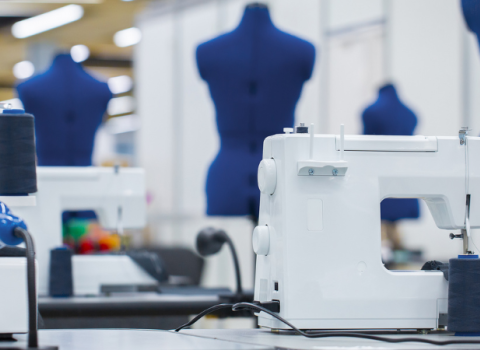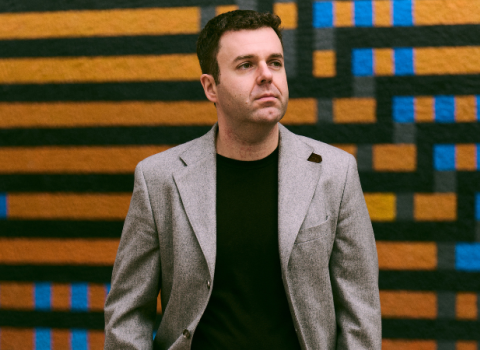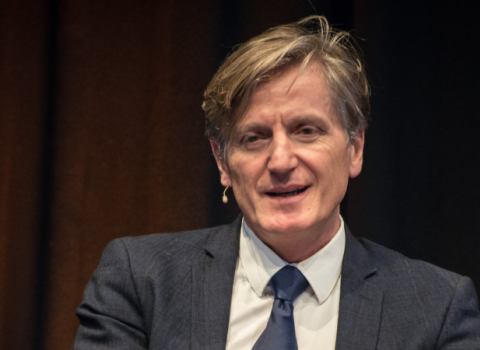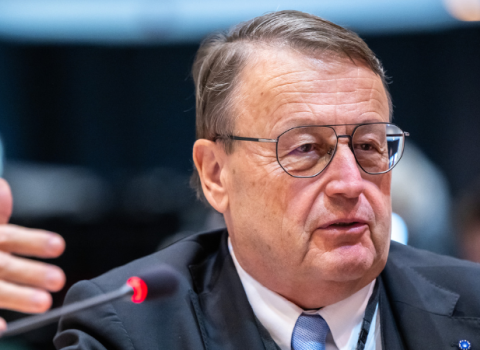
An artist's image of the EPFL Rolex Learning Centre
At the Swiss Institute of Technology in Lausanne the campus is filled with crates, cement mixers and bulldozers. From his office overlooking the building site of the future library known as the Learning Centre, EPFL, president Patrick Aebischer is contemplating the eight years of intense transformation that have brought EPFL, this year, to the 18th position in the Shanghai University ranking for computer science and engineering, and to the 50th in the overall rankings published by the Times Higher Education Supplement.
The initiatives that have driven this improvement are countless. Aebischer has masterminded a root and branch reform of EPFL governance, totally redesigning the interfaces between departments, taken over maths, chemistry and physics from neighbouring University of Lausanne, along with microtechnology from Neuchatel University. And as neurobiologist and geneticist, Aebischer has introduced life science research into the engineering school and put more emphasis on fundamental research.
At the same time EPFL has opened its doors to the private sector. Aebischer's predecessors created a science park that to date has spun off 286 companies. In total these businesses have raised CHF500 millions in funding. Now, Aebischer is launching a new low-cost incubator for would-be entrepreneurs that lack seed money. To test the scientific and business credentials of those after a space in the incubator he has created an advisory board that brings together entrepreneurs and business people including Daniel Borel, the founder of Logitech, Frank Riboud CEO of the food company Danone, Ernesto Bertarelli, past CEO of Serono and two time winner of the America's cup and prominent business angel Martin Velasco.
The Learning Centre that is currently under construction is largely funded by companies, including watchmaker Rolex and pharmaceuticals giant Novartis. Its sinuous reinforced concrete structure is a potent metaphor of the transformation of EPFL. Designed by the Japanese architectural firm Sanaa, it is, Aebischer says, "A tribute to change", and a "cabalistic" symbol to show the world that EPFL is no longer in Zurich's shadow.
That commitment to change is at the heart of Aebischer's philosophy. To achieve it he has not hang-ups about using modern marketing and tapping the resources of Switzerland's gold-plated corporations. It is under his reign that EPFL engineers and computational resources were applied to help Swiss sailing team Alinghi to design the boats that won twice the Americas Cup.
Aebischer is a vice president of the Global University Leaders Forum, a think tank created by the Davos forum to gather together prominent university rectors and vice chancellors. From this perspective he believes, "Europe is establishing a league of ten to twenty world class technical and scientific schools, at a level that can compete with their existing counterparts in the US, and emerging ones in China in India." His job is to make sure that EPFL will plays in that global league.
There may be some who see that as an unrealistic ambition, but there is no doubt Aebischer has the vision to achieve it, and there are signs that others agree he is on the right track. With European countries including Belgium, France, Germany and Finland embracing big modernisation plans for their universities, Aebischer has received a stream of visitors eager to learn how he and his team of deans have put EPFL on the world map.
The first thing they discover is that EPFL has not tried to reinvent the wheel. Having spent ten years as a professor and then a department chair at Brown University in Rhode Island, Aebischer says, "We have simply been taking what works best in the US and adapting it here." In this he has the support of his colleagues. As he notes, "All EPFL's Deans of faculty are Europeans or Americans that hold faculty position in top US Universities."
Since 2000 Aebischer has been on a head hunting mission in US universities, targeting European-born professors in revolt against the Bush administration's policy towards science and immigration, and ready to fall into the embracing arms of European culture.
One factor in Aebischer favour has been that unlike elsewhere in Europe, the research system in Switzerland is based on research grants. Like the US National Science Foundation and the US National Institutes of Health, the Swiss national fund for scientific research manages national grants through a competitive process. And unlike France and Germany, research and education are closely linked, something professors used to the US system tend to appreciate. The system also, "Avoids transforming researchers into bureaucrats," emphasised Aebischer, while ensuring that "New minds constantly refresh the system." This experience of competing for grants is no stranger of EPFL number one position in the ranking of European institutions that get the recently launched ERC (European Research Council) advanced grants.
Aebischer has also introduced typical American procedures such as tenure track - a trial period during which junior members of faculty compete to establish track records allowing them to become professor. Half of the newly-recruited professors at EPFL come from that home grown pool.
More recently, he has also transformed the mechanism of collaboration between the school and private companies. For instance, EPFL has introduced bigger overhead payments by companies for research contracts, in return granting them full intellectual property rights. "Patenting innovation that came from prior contracts with industry has proved a nightmare that produced benefit mainly for patent lawyers," Aebischer comments.
Despite all his clearing of the bureaucratic undergrowth, Aebischer as the son of two, artists, knows that the success of MIT, Caltech or Stanford relies not only on an institutional framework, but on culture. "US universities are not places where people consume lectures but places to live," he says. That's why EPFL's Learning Centre is not only a library, but a meeting space. That is also why EPFL is building student accommodation on its campus, along with a hotel for visitors, a congress centre to hold weekly scientific seminars, and seven ten storey buildings to house private corporate laboratories.
The developments come at price. Even though EPFL has space on its campus, its CHF 488 million federal funding is constrained. Aebischer has looked elsewhere for funding. "Up to 2010 we will have raised CHF500 million for our construction projects of which only 10 percent is public money."
Thanks to public-private partnerships with property development companies and contracts with private corporations such as Nokia, Nestle, Debiopharm, Microsoft, Novartis, Merck Serono and Logitech, EPFL has been able to find both investors in its new buildings and long term tenants. Some of the corporate sponsors, along with other private donors have funded 20 professorial chairs over the last two years.
Taken with other fundraising activities with national or European agencies, this means that more than a quarter of EPFL's CHF 637 million total budget now comes from external sources.
The strength of Aebischer's strategy is evident. Not only has EPFL has been able to announce one major research contract with a private partner every month this year, but it is attracting students from 50 different countries. Since 2000, the total number of students at EPFL increased from 4,200 to 6,700 this year. And significantly, the increase is even faster at PhD level - going from 700 in 2000 to 1,600 in 2008. Whilst at undergraduate level Swiss nationals represent between 70 to 80 percent of students, foreign nationals account for 65 percent at PhD level. Most of them come from neighbouring European countries, because they find, next to Lake Geneva, what maybe is promising to be the first true European institute of technolog





 A unique international forum for public research organisations and companies to connect their external engagement with strategic interests around their R&D system.
A unique international forum for public research organisations and companies to connect their external engagement with strategic interests around their R&D system.